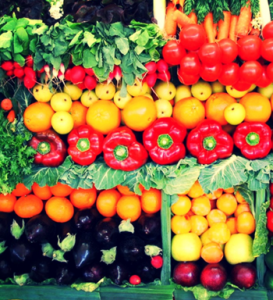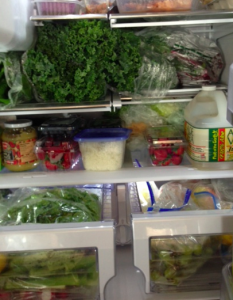29 Aug Your Veggies – Fresh, Frozen or Canned?
EAT YOUR VEGETABLES! EAT YOUR VEGGIES! 
That’s all we ever hear, right? From childhood through adulthood, we are constantly told to eat our veggies. And for good reason of course! A colorful diet packed with lots of veggies equals a leaner, healthier physique for an individual, both inside and out. And those veggies provide you with valuable nutrients like fiber, antioxidants, minerals and vitamins that are necessary for long-term health.
Plus, all vegetables are naturally gluten free which is a must for people with celiac sprue like myself, but it is also beneficial to anybody with an auto-immune disease or thyroid issue.
If you are following ANY of my programs, you have surely noticed that they are all loaded with vegetables. Sometimes we cook them, and sometimes we enjoy them raw, but the question that always comes back to me is which way of eating vegetables is better?
Let’s discuss!
What is the best way to EAT vegetables?
First and foremost, you should know that raw vegetables start losing nutrients as soon as they are picked. And any vegetable that has to be shipped cross-country is often picked before full maturity, which prevents it from reaching its’ complete nutrient potential. That’s why I encourage you to buy organic, NONGMO, in-season, local freshly picked produce.
The quicker you eat it after being harvested, the better it is for you!
Now unbelievably, in some cases cooking a vegetable actually helps to increase certain nutrients. How is this possible? Cooking a vegetable softens and moisturizes it, and breaks down cellular walls. That makes it easier to digest and absorb.
Two great examples are carrots and tomatoes. When you cook carrots, the levels of beta carotene increase. Beta carotene can then be converted to vitamin A, which is associated with improved bone, eye and reproductive health.
As for tomatoes, the Italians seem to have this one right! The carotenoid Lycopene in tomatoes increases when they are cooked, and lycopene is associated with reduced incidence of heart disease and cancer. It’s actually been speculated that our bodies absorb more of these beneficial anti-cancer compounds, such as the carotenoids and phytochemicals found in carrots and tomatoes) when foods are cooked.
How do you cook them?
Even though cooking carrots and tomatoes helps to unlock specific benefits, you need to pay attention to HOW you are opting to cook your vegetables, as that determines levels of nutrients lost. Applying high levels of heat to vegetables leads to nutrient loss, and we want to minimize that scenario.
It’s the water-soluble vitamins such as C and B that are most effected, along with minerals such as phosphorus, calcium, potassium, magnesium, zinc and iron. When opting to cook, use methods that reduce the amount of time your vegetables are exposed to high heats. Lightly steaming (they should still have crunch and texture), versus methods like boiling, barbecuing, baking, frying, or broiling, is the best option.
What about Canned or Frozen Vegetables?

My fridge! Loaded with veggies
So we know that fresh vegetables are good, and we know that sometimes cooked vegetables are good too, but what about when they are canned or frozen?
You might have expected me to say that canned and frozen vegetables should be avoided – nope! Most canned vegetables are canned on-site when freshly picked, and have the same levels of nutrients as fresh vegetables.
I can’t promise that they are organic or GMO-free, but they can be a better option than no vegetables at all. They have a longer shelf-life of course, so it’s a good idea to keep some canned veggies around in case you find your vegetable drawer unexpectedly empty.
When buying canned vegetables, you absolutely MUST take notice of the sugar and salt content. You want as little additional sodium or sugar as possible – preferably none at all. “Reduced Sodium” is NOT the same as “No Salt Added”, so be careful when reading your labels.
What you will definitely notice when eating canned vegetables is a difference in texture and taste from the fresh stuff. So don’t be surprised when those canned peas don’t taste as good as the fresh ones!
And Frozen Veggies?
There is a wide variety of frozen vegetables available to us. Again, frozen vegetables are better than none at all and are a great option to keep handy if and when the produce drawer is found empty.
The process of freezing a vegetable involves first blanching them (a very quick dunk in boiling water) and then flash freezing them. Although some water-soluble nutrients may be reduced, the vegetables are then locked into a very nutrient-rich state once frozen. Again it’s up to you to read your labels and make the right choices.
Opt for organic whenever possible, and beware of frozen vegetables that come with sauces or seasonings, which are usually high in calories and sodium. Make sure that what you are getting is 100% vegetable!
What does is all come down to?
It all comes down to this….just eat your vegetables!
Not only do they support an alkaline body (which can play a HUGE role in disease prevention) but they keep you FULL. This can ALSO help to aid in weight loss. Consume organic seasonal vegetables whenever possible, but if something is out-of-season, a canned or frozen option is a valid go-to.
Read your nutrition labels and be aware of too much sodium or sugar. And minimize cooking times as well as heat intensity so that your body benefits from the maximum nutrients possible!
Ultimately, no matter where you live or what season it is, you can’t claim that you can’t eat your vegetables!
“Be Happy…Be Healthy…Be Fit!”
– Natalie Jill
Unprocess your diet and lose 5-7lbs the first week you start! Download the ORIGINAL 7 day jump start plan HERE.
Pick up my hard-copy book, Unprocess Your Diet, with 84 new recipes HERE.
